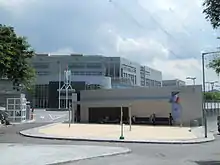Lo Wu Correctional Institution
Lo Wu Correctional Institution (Chinese: 羅湖懲教所) is a medium-security prison in Lo Wu, New Territories, Hong Kong. It houses adult women prisoners and remands. It is the largest women's prison in Hong Kong.
 Exterior view | |
 Lo Wu Correctional Institution Location within Hong Kong | |
| Location | 163 Ho Sheung Heung Road Sheung Shui, New Territories |
|---|---|
| Coordinates | 22.5165°N 114.1110°E |
| Status | Operational |
| Security class | Medium security |
| Capacity | 1,400 |
| Opened | August 1997 |
| Managed by | Correctional Services Department |
| Director | Tsung Chui-yee, Senior Superintendent |
History
The site of the prison was formerly a British Forces base called Lo Wu Camp, which was later used to accommodate Vietnamese refugees.[1][2] To help alleviate prison overcrowding, the military base was converted into the minimum-security Lo Wu Correctional Institution, which upon completion in August 1997 had a capacity of 208.[1]
Overcrowding of the prison system remained a problem. Hence, the government developed plans to redevelop the Lo Wu Correctional Institution to provide a total of 1,400 penal places, an increase of nearly 1,200. In July 2006, the redevelopment plan was endorsed by the Finance Committee of the Legislative Council.[3][4]
Work began in April 2007. Construction was carried out by contractor Yau Lee Group.[5][6] The design-and-build contract was administered by the Architectural Services Department of the Hong Kong government.[7] A topping-out ceremony was held on 11 August 2009.[8]
The project was completed in April 2010. The new facility began operation on 2 July 2010, when the first 135 inmates arrived from Chi Ma Wan Correctional Institution, which was subsequently closed for redevelopment. Others came Lai Chi Kok Correctional Institution, which also closed and was later merged into Lai Chi Kok Reception Centre.[9][5]
The chief executive of Hong Kong, Donald Tsang, formally opened the rebuilt Lo Wu Correctional Institution on 24 August 2010. The redevelopment project cost approximately HK$1.5 billion.[5]
Description
The prison has a capacity of 1,400. It houses adult women prisoners and remands.[10] There are three wings. The minimum-security Main Wing has a capacity of 600. The medium-security East and West wings each provide 400 penal places.[5]
Located in a rural area with no public sewer system, Lo Wu Correctional Institution was built with its own membrane bioreactor sewage treatment plant.[11]
According to a 2020 news article, approximately 40 per cent of inmates are of non-Chinese ethnicity.[12]
Notable inmates
- Agnes Chow – activist (until 31 December 2020)
- Yau Wai-ching – former lawmaker[13]
See also
References
- "Overcrowdedness in Penal Institutions". Panel on Security, Provisional Legislative Council. 18 September 1997.
- "Security Bureau". Progress Report of the 1997 Policy Address. Government of Hong Kong. 1997.
- "Plans to ease prison overcrowding in hand". Government of Hong Kong. 10 June 2006.
- "Prison redevelopment top priority". Government of Hong Kong. 11 January 2007.
- "CE officiates at opening of Lo Wu Correctional Institution (with photos)". Government of Hong Kong. 24 August 2010.
- "Yau Lee builds correctional institute". Hong Kong Engineer. The Hong Kong Institution of Engineers. October 2007.
- "Design and Construction of the Redevelopment of Lo Wu Correctional Institution". Yau Lee Group. Retrieved 18 December 2020.
- "Staff Activities". Yau Lee Group. Retrieved 18 December 2020.
- "Lo Wu Correctional Institution starts intake of inmates (with photos)". Government of Hong Kong. 2 July 2010.
- "Lo Wu Correctional Institution". Correctional Services Department. Retrieved 18 December 2020.
- Ching, K.F.; Hong, Nelson (2013). "Design and Operation of MBR Type Sewage Treatment Plant at Lo Wu Correctional Institution, Hong Kong" (PDF). Drainage Services Department.
- Shjum, Michael (29 October 2020). "Minority officers turn keys proudly". The Standard.
- Chung, Kimmy (30 June 2018). "Former Hong Kong lawmaker released from prison after serving four weeks for Legislative Council storming". South China Morning Post.